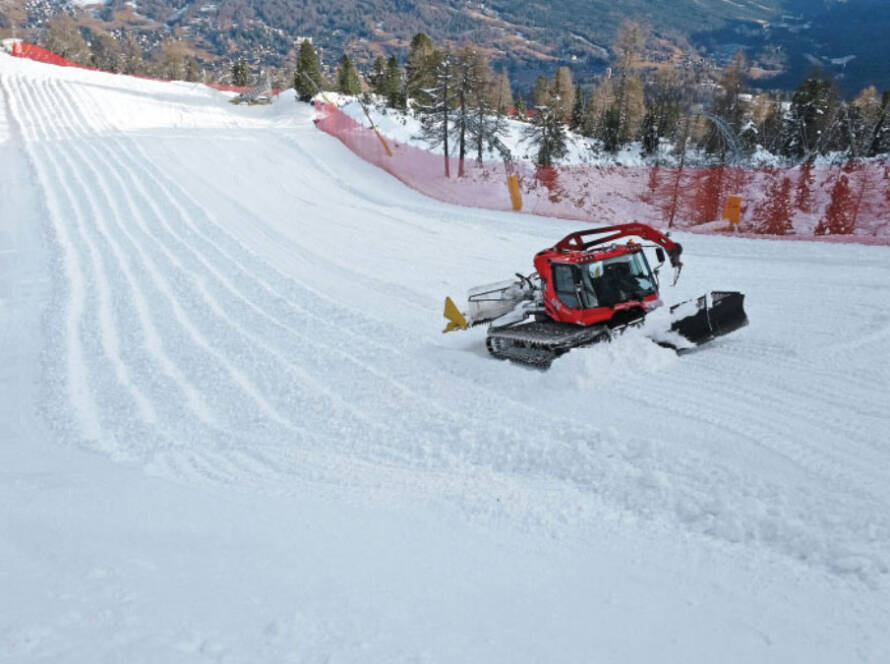Ski area resort operations become more complex as the industry tries to respond to climate change, new technologies, sustainability efforts and increasing guest expectations for a vacation experience that meets their diverse desires.
Ski area management encompasses an ever-widening range of responsibilities, from ski and lift operations to service and retail components, business, marketing and everything in between. As a result, becoming a ski area manager today will most likely mean holding a bachelor’s degree in a marketing, finance or business-related field.
The ski area management program at Northern Michigan University (NMU), in partnership with Gogebic Community College (GCC) in Ironwood, Mich., provides one of the few specialized programs in the U.S., joining the unique requirements of the ski industry with an academic business degree.
At GCC, students learn technical skills to manage ski areas or ski resort operations while earning an associate degree. At NMU, students gain comprehensive knowledge of accounting, finance, management, marketing and computer information systems.
“We started this partnership with [GCC] about 15 to 20 years ago when we realized that many of the entertainment ski resorts have great potential for long-term careers in management,” said Carol Johnson, dean of the College of Business at NMU. “Many of our students were young, worked in the industry and had a great time skiing, but eventually, reality set in and they found themselves pigeonholed, not moving forward in their careers. Achieving a bachelor’s degree in ski area business management would enable them to continue in the hospitality and recreation industry, and be upwardly mobile within larger corporations and ski resorts.”
Learning ski area management from start to finish
“Students attend [GCC], attain all the technical knowledge they need and then come to NMU for two years to do the business part of things,” said Johnson. “Our articulation agreement with the community college is renewed periodically as we make improvements to our curriculum and changes in requirements to make sure students have a seamless transition from the [GCC] program to ours.”
At GCC, students receive hands-on technical training and academic studies over the two years they are working towards a ski area management associate degree. The Mt. Zion Recreational Complex, owned and operated by the college, provides a major advantage for students in achieving real-world experience.
First-semester courses encompass basic background information in many aspects of ski area operations, such as fundamentals of snowmaking, appropriate emergency response and basic accounting principles. Next semester builds upon these courses to cover ski lift construction and design, mapping and slope grooming while bringing in some of the broader reaches of management with economics and general psychology.
Students study cost analysis of ski area operations, risk management, introduction to office computer systems and applied industrial skills. The final step in finishing the program is the five-month co-op work experience. All sophomore students participate in this internship, gaining operational experience and making valuable connections in an actual resort environment.
“We decided to put the bachelor’s portion online so students could continue [to work and still complete] their degree and have opportunities for upward mobility.”
Carol Johnson, Northern Michigan University
After receiving an associate degree, students can transfer 100 percent of their credits to NMU to complete a bachelor’s degree through campus-based or online business courses such as accounting, marketing and computer information systems.
Many of these business courses at NMU are geared toward ski area management needs. Introduction to ski area management gives insight into the U.S. ski industry history and growth, market surveys, management and types of resort ownership. Every aspect of ski area operations is covered in other courses, including looking at the design and construction of the most common types of ski lifts, operations and maintenance procedures, record-keeping, regulatory agencies and safety requirements.
Workshops in ski area management provide supervisory staff with appropriate training and methodologies to help them achieve operational goals through the development of seasonal employees. Students will also complete a basic feasibility study on the building and operating costs of designing and implementing a ski resort complex.
In human resource management, future managers learn the principles and practices of productive employee relations, emphasizing employee selection, development and motivation. Strategic management covers business and corporate level strategies, mission and goals and corporate entrepreneurship through written and oral case analysis. Using current spreadsheet applications and database management systems, students will complete quantitative business problem-solving in preparation for effective roles in management.
Making it happen on an individual timeline
Recently, the NMU program began to offer its bachelor of ski area management program entirely online to help students complete their degree wherever they are and in whatever stage of career advancement. Johnson says they were finding that students would advance through the GCC program, go out to complete the co-op part at a ski resort, love the work and not come back to finish their bachelor’s degree.
“To facilitate further advancement, we decided to put the bachelor’s portion online so students could continue [to work and still complete] their degree and have opportunities for upward mobility,” she said.
NMU offers some ski area management courses in eight-week segments and a robust summer offering so that students can work year-round, but still achieve their ski area business management degree in two years.
Johnson says that the Business College at NMU has a cohort to facilitate graduation. If students are willing to try, NMU will find a way to help them. For example, if a potential student has been working at a ski resort for years, but didn’t achieve an associate degree, they can transfer previously earned credits into the program and continue.
“We are also exploring what we call ‘prior service learning credits,’” Johnson said. “Maybe a student isn’t able to document their experience in the form of academic credits, but has been doing the same work that is covered in, say, financial accounting; in that case, we might be able to credit them with that course. In addition, we offer the management part of the program through our global campus, which is online.
“We’re not the only school offering this type of program. Students might choose to transfer NMU credits to another university to finish up; it all depends on where they are – if they’re working full-time or working for a company that offers a tuition program. Everyone is in a different position, but we will gladly try to help them achieve their degree.”
As the future continues to bring significant changes and challenges to ski area resorts around the globe, the ski area business management degree program at NMU is opening doors to many rewarding career opportunities for those passionate about working and succeeding in the industry.



![[image placeholder]](https://www.snowopsmag.com/wp-content/uploads/2023/09/placeholder@2x-890x664.png)